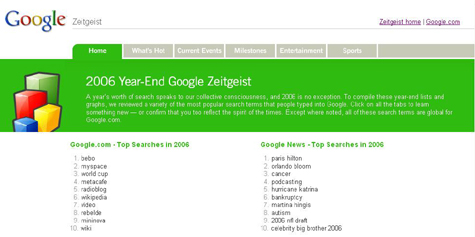Google Q & A on Google Zeitgeist: Exclusive

I juxtaposed Google Zeitgeist 2006 vs. Yahoo Buzz 2006 yesterday in “Google searchers vs. Yahoo searchers.”
Digital Markets TalkBacker saran945@... underscored: “no words/phrases repeated in both search engines.”
Why not? I touched base with leading search engine Google to find out and got an inside look at how the Google Zeitgeist is formulated and reported.

Below is my Exclusive Q & A with a Google spokesperson:
Q) The Google "Zeitgeist This Week" reports "Gaining Search Queries: Week Ending Month, Day, Year? What does "Gaining Search Queries" mean?
GOOGLE: "Gaining" means those queries rising fastest in popularity, typically they are related to news, so they rise and fall fairly quickly. If you compare several weeks' worth of the Google Weekly Zeitgeist, very few terms carry over.
Q) Does "Gaining Search Queries" definitively equate to "Most Searched Queries"?
GOOGLE: No. "Gaining" means those queries rising fastest in popularity. "Most searched", i.e. "most popular", represent a consistently large volume of a particular search term over time.
Q) Does Google publish publicly absolute top ten search queries performed at Google.com on a weekly basis? If yes, where?
GOOGLE: http://www.google.com/press/zeitgeist.html -- we publish this every week. The new lists appear on Monday for the previous week. They are also present here: http://googlepress.blogspot.com/ (News from Google).
Q) Does Google publish publicly the top ten search queries performed at Google.com in 2006? If yes, where?
GOOGLE: The link is here: http://www.google.com/intl/en/press/zeitgeist2006.html
Q) Why are all of Google Zeitgeist search query data in lower case? Do searchers only perform searches in lower case at Google?
GOOGLE: People most often type in lower case. There are some variations in queries we see in upper and lower case, but we have standardized on this format.
Q) There is no overlap between Google Zeigeist Top Ten 2006 and Yahoo Buzz Top Ten 2006, according to published data. Is Google surprised, given that users often perform the same searches at the two properties?
GOOGLE: We don't know that people perform the same searches at the two properties. Also, Google and Yahoo may employ different methods for estimating this information.
Q) Has Google researched why Website URLs are top search queries, such as bebo or MySpace? Does Google have a theory as to why URLs are entered into the Google search box for navigation to a well known Website, rather than a direct URL entry in a users' browser?
GOOGLE: It's possible that people type the phrase or property name into the Google search box so they will see the domain name at the top of the search results. It's also possible that people equate the Google search box with their browser window. Google is often used as the gateway to the Internet.